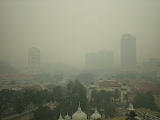
Haze
WordNet
noun
(1) Confusion characterized by lack of clarity
(2) Atmospheric moisture or dust or smoke that causes reduced visibility
verb
(3) Harass by imposing humiliating or painful tasks, as in military institutions
(4) Become hazy, dull, or cloudy
WiktionaryText
Etymology
Formerly also hase; the earliest instances are of the latter part of the 17th century. Cf. Old Norse , akin to Old English .
Origin unknown; there is nothing to connect the word with Old English , .
Noun
- Very fine solid particles (smoke, dust) or liquid droplets (moisture) suspended in the air, slightly limiting visibility.
- 1772 December, James Cook, A Voyage Towards the South Pole and Around the World, vol. 1 ch. 2:
- Our hopes, however, soon vanished; for before eight o'clock, the serenity of the sky was changed into a thick haze, accompanied with rain.
- 1895, H.G. Wells, The Cone:
- A blue haze, half dust, half mist, touched the long valley with mystery.
- The degree of cloudiness or turbidity in a clear glass or plastic, measured in percent.
- 1998, Leonard I. Nass and Charles A. Heiberger, Encyclopedia of PVC http://books.google.com/books?id=mDe7EidmglIC&, ISBN 0824778227, page 318:
- Haze is listed as a percent value and, typically, is about 1% for meat film.
- Any substance causing turbidity in beer or wine.
- 1985, Philip Jackisch, Modern Winemaking http://books.google.com/books?id=Zf-24UvvT4oC, ISBN 0801414555, page 69:
- Various clarifying and fining agents are used in winemaking to remove hazes.
- Mental confusion; the state of being in a haze.
- 2000, Daphné Du Maurier, The Scapegoat http://books.google.com/books?id=cf4-iVG03pEC, ISBN 081221725X, page 218:
- In my haze of alcohol, I thought for one crazy instant that he had plumbed my secret.
Verb
- To perform an unpleasant initiation ritual upon a usually non-consenting individual, especially freshmen to a closed community such as a college or military unit.
- To oppress or harass by forcing to do hard and unnecessary work.

